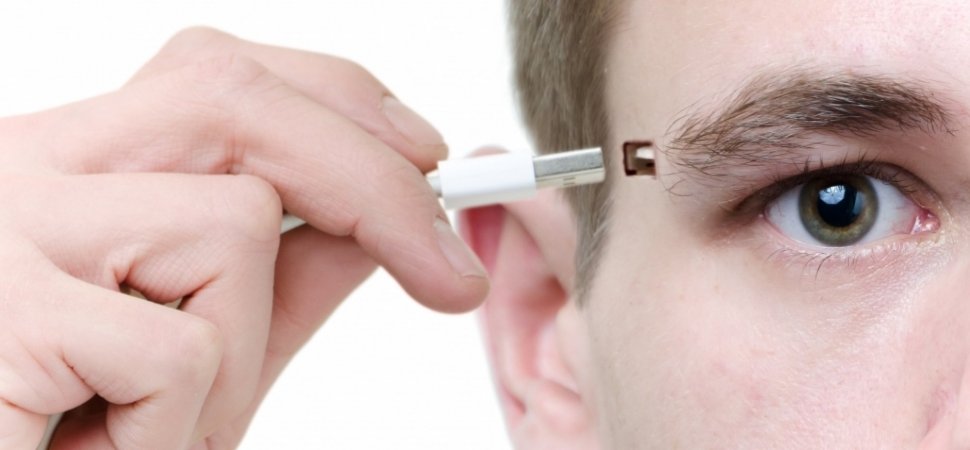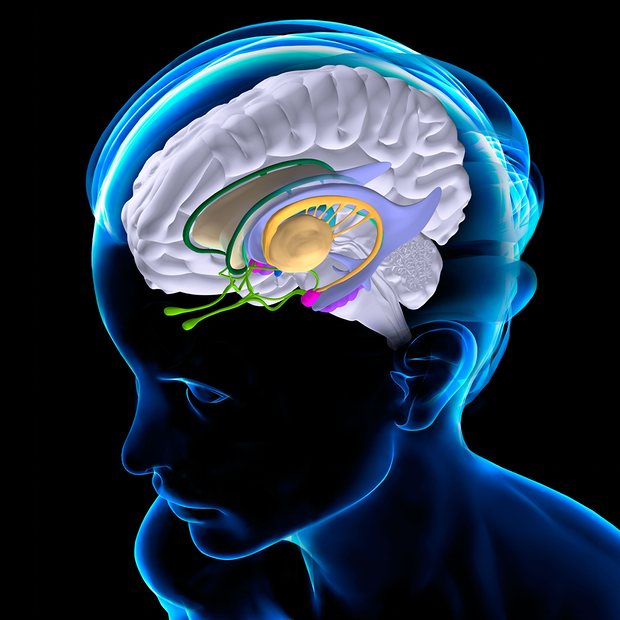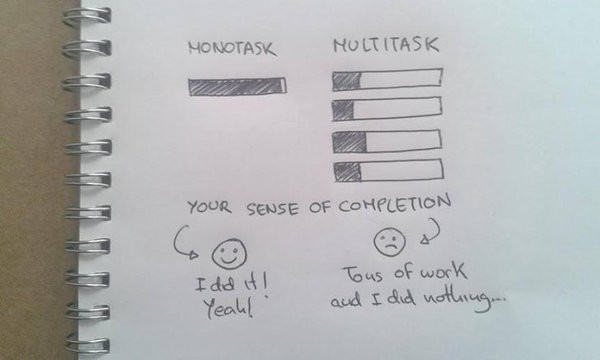How to manage to do everything and save the brain
Welcome to the pages of the blog iCover ! Doesn’t it even more and more often sound good advice about the need to “turn on multitasking mode” more often, the so-called "Multitasking"? And on the other hand, exactly the same number of times intuition tells us that the popular wisdom telling about a pair of hares lost in the fog is not devoid of common sense. Where does the truth lie to which today it will be right to strive? What can be the cause for our health and success to be too enthusiastic about trying to repeat Caesar's feat? Let's try to understand these not simple questions, as always relying on the authoritative opinion of representatives of science.

Today our brain is busy more than ever before. In an endless stream of information, we are constantly trying to separate the wheat from the chaff. It tires. On the other hand, today we manage to manage much more than before. Three decades ago, travel agents booked our train and air tickets, salespeople helped us find what we were interested in, typists and secretaries put the burden of everyday correspondence on themselves. Now we are doing all these and many other things, keeping up with the times and technologies, on our own.

')
Our smartphones combined the capabilities of calculators, dictionaries, translators, web browsers, calendars and voice recorders, mini-screens of cinemas, instant messengers and even flashlights. In terms of the number of functions, they can be safely compared with Swiss army knives, and in terms of performance, they will easily give odds to the most advanced computers 30 years ago in the headquarters of IBM. And every free minute, we will certainly use their capabilities to the maximum, composing the text of a message walking down the street, standing in a queue or hastily tipping a cup of coffee at lunchtime. And all this time we are fully confident that today we will again have time to do a few high-quality things. But the effectiveness of this “multitasking” is one of the greatest illusions of our days.
One of the frighteningly eloquent signs that make it possible to feel the scale of the effects of multitasking is our attitude to e-mail, or rather, to the process of its processing. As demonstrated by an experiment conducted in the MTI laboratory, only one fact of the realization that a box of emails is waiting for a box of emails to be read reduces the user's IQ by 10 points. The need to constantly monitor email leads to a marked decrease in overall performance. And the scale of this phenomenon is underestimated - analysts of the McKinsey Global Institute arrived at this conclusion in parallel, whose employees spend 28% (!) Of their working time on processing e-mail.
The Internet provides almost unlimited access and information juggling capabilities that are much larger than books or television. The topic for the mind and soul in the network is quite simple to find, and often we pack up an information product consumed during the day in small chunks - opening 10-15 tabs, occasionally making a circular raid or spontaneous electoral raids under an unpredictable scenario. Especially skillful information catchers divide each “portion” into several, tying a knot in memory to return to the topic in a few minutes-tabs.
Another wayward child of the century, literally devouring our brains and time, is the messengers, which, due to the specifics of the communication process, require much more frequent checks and responses to correspondence. The only way to take the problem under relative control is to try to accustom yourself and your surroundings to the fact that you control mail and correspondence in chat rooms strictly at a certain and limited time.
The first revelation is for those who are sure that they will repeat the “Caesar phenomenon” without much difficulty: when nature created our brain, she forgot to give it the ability to focus on more than one task at a time. Accordingly, the quality of the result is directly determined by the number of simultaneously solved tasks.
What we have said confirms the view, based mainly on the research of Earl Miller (Earl Miller) - one of the leading scientists in neuroscience from the Massachusetts Institute of Technology. He argues that our brain “... is not originally adapted to multitasking. When people are confident that they can cope with several tasks at once, in fact, they simply accelerate from one task to another. And for each such transition will be charged quite specific cognitive fee. It can be said that we are not able to simultaneously hold many balls in the air, as experienced magicians do. Even when we are confident that we have done a lot, the irony is that multitasking makes us significantly less effective. ”
Moreover, this practice, elevated to the rank of habit, develops a very dangerous addiction, which Miller called dopamine addiction.
The essence of this unpleasant phenomenon is as follows. Completion of a minor task, such as compiling and sending a response to a message in a chat, is accompanied by a micro-release of the neurotransmitter dopamine . So peculiar brain rewards us for the cause, carried to the end. Accordingly, a multitude of such small completed tasks stimulate frequent dopamine emissions, which quickly causes a feeling of addiction. This is how the feedback loop is formed: we have a deceptive feeling of completeness of many cases. In fact, we achieve a reduction in the sensitivity threshold to a value that does not allow us to evaluate the low quality and negligible value of the work done (our inefficiency). The ability to critically assess is also proportionally reduced, and the level of current intermediate goals drops dramatically. Simply put, if, for example, more recently, we felt the satisfaction of the brilliantly played combination on the chessboard and advancement in the standings, now we have learned how to get the dopamine bonus after periodically checking the mailbox replenishment information. It is clear that talking about any benefit and value of the deed in the latter case is often not necessary, and whether it is necessary, because a new portion of dopamine has been obtained and you can start preparing for the next one.
Operating the brain in multitasking mode results in cleaning our cells of irrelevant information, streamlining all this rubbish, and re-finding the correct goals, increasing the quality and efficiency of work is becoming increasingly difficult. This conclusion is confirmed by studies conducted at the University of London (University of London), which showed that the subjects solving several cognitive tasks at the same time following the results of short professional testing worsened their IQ in the same way as if they had not slept at night or smoked a fair amount of marijuana.
The second negative result that accompanies “life in multitasking mode” and, kind of, the fee for trying to extract dopamine in the manner described above is increased production of cortisol, a hormone that, when it enters the brain, provokes a feeling of fatigue and weakness.
Studies conducted using a magnetic resonance scanner at the University of Sussex (University of Sussex (UK)) have shown that indirectly related constant stress and multitasking may well cause irreversible changes in the brain. Those participants in the experiment who often used more than 1 device at the same time (note smartphone + TV) demonstrated a decrease in the level of empathy and emotional control. A pronounced decrease in the activity of the corresponding lobe of the brain was also recorded.

Russ Poldrack, a neuroscientist at Stanford University, showed that getting information in multitasking mode - watching TV while trying to get new knowledge (schoolchildren, students ...) leads to the fact that the information received accumulates in the striatum area where the brain stores information about accumulated motor experience, behavioral reactions, conditioned reflexes, and not in the area “set aside” for storing facts and ideas. If the learning process is organized correctly and there are no distractions, information enters the hippocampus, where it is redistributed and classified in a form that is easy to read.
Finally, switching from one mental task to another is accompanied by the burning of oxygenated glucose, the fuel of the brain. Such an energy expenditure manifests itself quite quickly in fatigue, discent of attention. The next stage is the search for a compromise between the body between cognitive and physical performance, increased irritability and impulsivity. On the contrary, concentration on one task provides information processing by the anterior part of the cingulate gyrus and striatum, which minimizes energy costs and reduces the brain's need for glucose to a minimum.

Do not forget that multitasking makes us constantly make some decisions. Distracting in search of an answer about a micro-problem - the next weather report or plans for a weekend, we spend almost as much energy on the response as on answering something important. As a result, when the time comes to make a really important decision, there is definitely not enough energy for adequate information processing.

Dear readers, we are always happy to meet and wait for you on the pages of our blog. We are ready to continue to share with you the latest news, review materials and other publications, and we will try to do everything possible so that the time spent with us will be useful for you. And, of course, do not forget to subscribe to our headings .
Our other articles and events

Today our brain is busy more than ever before. In an endless stream of information, we are constantly trying to separate the wheat from the chaff. It tires. On the other hand, today we manage to manage much more than before. Three decades ago, travel agents booked our train and air tickets, salespeople helped us find what we were interested in, typists and secretaries put the burden of everyday correspondence on themselves. Now we are doing all these and many other things, keeping up with the times and technologies, on our own.

')
Our smartphones combined the capabilities of calculators, dictionaries, translators, web browsers, calendars and voice recorders, mini-screens of cinemas, instant messengers and even flashlights. In terms of the number of functions, they can be safely compared with Swiss army knives, and in terms of performance, they will easily give odds to the most advanced computers 30 years ago in the headquarters of IBM. And every free minute, we will certainly use their capabilities to the maximum, composing the text of a message walking down the street, standing in a queue or hastily tipping a cup of coffee at lunchtime. And all this time we are fully confident that today we will again have time to do a few high-quality things. But the effectiveness of this “multitasking” is one of the greatest illusions of our days.
One of the frighteningly eloquent signs that make it possible to feel the scale of the effects of multitasking is our attitude to e-mail, or rather, to the process of its processing. As demonstrated by an experiment conducted in the MTI laboratory, only one fact of the realization that a box of emails is waiting for a box of emails to be read reduces the user's IQ by 10 points. The need to constantly monitor email leads to a marked decrease in overall performance. And the scale of this phenomenon is underestimated - analysts of the McKinsey Global Institute arrived at this conclusion in parallel, whose employees spend 28% (!) Of their working time on processing e-mail.
The Internet provides almost unlimited access and information juggling capabilities that are much larger than books or television. The topic for the mind and soul in the network is quite simple to find, and often we pack up an information product consumed during the day in small chunks - opening 10-15 tabs, occasionally making a circular raid or spontaneous electoral raids under an unpredictable scenario. Especially skillful information catchers divide each “portion” into several, tying a knot in memory to return to the topic in a few minutes-tabs.
Another wayward child of the century, literally devouring our brains and time, is the messengers, which, due to the specifics of the communication process, require much more frequent checks and responses to correspondence. The only way to take the problem under relative control is to try to accustom yourself and your surroundings to the fact that you control mail and correspondence in chat rooms strictly at a certain and limited time.
Our brain is not originally adapted for the “seven feats”
The first revelation is for those who are sure that they will repeat the “Caesar phenomenon” without much difficulty: when nature created our brain, she forgot to give it the ability to focus on more than one task at a time. Accordingly, the quality of the result is directly determined by the number of simultaneously solved tasks.
What we have said confirms the view, based mainly on the research of Earl Miller (Earl Miller) - one of the leading scientists in neuroscience from the Massachusetts Institute of Technology. He argues that our brain “... is not originally adapted to multitasking. When people are confident that they can cope with several tasks at once, in fact, they simply accelerate from one task to another. And for each such transition will be charged quite specific cognitive fee. It can be said that we are not able to simultaneously hold many balls in the air, as experienced magicians do. Even when we are confident that we have done a lot, the irony is that multitasking makes us significantly less effective. ”
Moreover, this practice, elevated to the rank of habit, develops a very dangerous addiction, which Miller called dopamine addiction.
The essence of this unpleasant phenomenon is as follows. Completion of a minor task, such as compiling and sending a response to a message in a chat, is accompanied by a micro-release of the neurotransmitter dopamine . So peculiar brain rewards us for the cause, carried to the end. Accordingly, a multitude of such small completed tasks stimulate frequent dopamine emissions, which quickly causes a feeling of addiction. This is how the feedback loop is formed: we have a deceptive feeling of completeness of many cases. In fact, we achieve a reduction in the sensitivity threshold to a value that does not allow us to evaluate the low quality and negligible value of the work done (our inefficiency). The ability to critically assess is also proportionally reduced, and the level of current intermediate goals drops dramatically. Simply put, if, for example, more recently, we felt the satisfaction of the brilliantly played combination on the chessboard and advancement in the standings, now we have learned how to get the dopamine bonus after periodically checking the mailbox replenishment information. It is clear that talking about any benefit and value of the deed in the latter case is often not necessary, and whether it is necessary, because a new portion of dopamine has been obtained and you can start preparing for the next one.
Multitasking and quality of work
Operating the brain in multitasking mode results in cleaning our cells of irrelevant information, streamlining all this rubbish, and re-finding the correct goals, increasing the quality and efficiency of work is becoming increasingly difficult. This conclusion is confirmed by studies conducted at the University of London (University of London), which showed that the subjects solving several cognitive tasks at the same time following the results of short professional testing worsened their IQ in the same way as if they had not slept at night or smoked a fair amount of marijuana.
The second negative result that accompanies “life in multitasking mode” and, kind of, the fee for trying to extract dopamine in the manner described above is increased production of cortisol, a hormone that, when it enters the brain, provokes a feeling of fatigue and weakness.
The consequences may be irreversible.
Studies conducted using a magnetic resonance scanner at the University of Sussex (University of Sussex (UK)) have shown that indirectly related constant stress and multitasking may well cause irreversible changes in the brain. Those participants in the experiment who often used more than 1 device at the same time (note smartphone + TV) demonstrated a decrease in the level of empathy and emotional control. A pronounced decrease in the activity of the corresponding lobe of the brain was also recorded.

Russ Poldrack, a neuroscientist at Stanford University, showed that getting information in multitasking mode - watching TV while trying to get new knowledge (schoolchildren, students ...) leads to the fact that the information received accumulates in the striatum area where the brain stores information about accumulated motor experience, behavioral reactions, conditioned reflexes, and not in the area “set aside” for storing facts and ideas. If the learning process is organized correctly and there are no distractions, information enters the hippocampus, where it is redistributed and classified in a form that is easy to read.
Finally, switching from one mental task to another is accompanied by the burning of oxygenated glucose, the fuel of the brain. Such an energy expenditure manifests itself quite quickly in fatigue, discent of attention. The next stage is the search for a compromise between the body between cognitive and physical performance, increased irritability and impulsivity. On the contrary, concentration on one task provides information processing by the anterior part of the cingulate gyrus and striatum, which minimizes energy costs and reduces the brain's need for glucose to a minimum.

Do not forget that multitasking makes us constantly make some decisions. Distracting in search of an answer about a micro-problem - the next weather report or plans for a weekend, we spend almost as much energy on the response as on answering something important. As a result, when the time comes to make a really important decision, there is definitely not enough energy for adequate information processing.

Dear readers, we are always happy to meet and wait for you on the pages of our blog. We are ready to continue to share with you the latest news, review materials and other publications, and we will try to do everything possible so that the time spent with us will be useful for you. And, of course, do not forget to subscribe to our headings .
Our other articles and events
- Gator Caref Watch. Caring for your child
- Spring discounts from KitchenAid
- Sale of useful gadgets and interesting pieces
- Jawbone UP3 vs. Xiaomi Mi Band 1S Pulse - the battle for our hearts!
- A selection of smart watches today. What changed?
- Spring discounts on Onkyo Hi-Fi equipment
- Logitech gives Tom Clancy's the Division
Source: https://habr.com/ru/post/392373/
All Articles